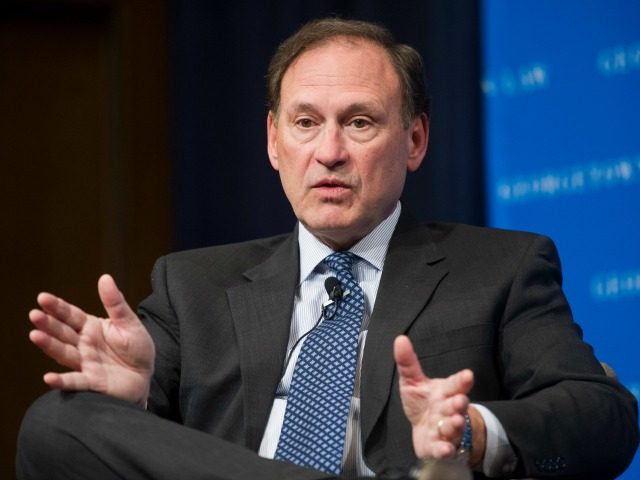WASHINGTON—Justice Samuel Alito opened the Federalist Society’s National Lawyers Convention at the Mayflower Hotel last Thursday with a speech lauding his departed colleague Justice Antonin Scalia, with tales and reflections both professional and personal.
Alito framed the discussion for the entire three-day conference, which was dedicated entirely to Scalia’s legacy. He started on a “law geek” note, flagging a pet peeve of Scalia’s when interpreting federal statutes: whether courts should consider congressional committee reports and lawmakers’ official speeches when determine the meaning of part of a law.
“Was there anyone there at the time?,” Scalia would ask bitingly of a lawyer asserting legislative history during oral argument, referring to the fact that legislative history consists mainly of remarks individual members make to an almost-empty chamber or during a committee hearing, and sometimes even just comments filed in the record but never spoken to other lawmakers.
“Did the president sign the [committee] report?,” he would add sarcastically.
These two justices are from different legal generations. Scalia was nominated by Ronald Reagan and joined the High Court in 1986, while Alito was picked by George W. Bush and confirmed in 2006.
Alito said that after Scalia passed away he found he was asking himself in certain cases a question that he said “struck me as slightly sacrilegious: What would Scalia do?” (obliquely referencing a popular acronym among Christians—WWJD: What Would Jesus Do?)
He described Scalia’s approach and service as transformative in how the Court goes through the process of deciding cases, and that his absence is “palpable” at oral arguments and at the justices’ closed-door conferences where they decide cases.
The New Jersey-born Alito (who also ribbed Scalia for not embracing his own New Jersey roots) then surveyed “some of the constitutional fault lines that we have at the present time.”
He expressed concern about the current push from liberal Democrats to pass “an amendment to the First Amendment,” one that would curtain political and campaign speech—most likely referring to the liberal talking point that the Citizens United decision must be overcome by constitutional amendment.
In Citizens United, the Court held that groups like the National Rifle Association have the same rights as human beings to represent its members’ views by buying TV and radio ads to talk about candidates and issues during election season in an attempt to persuade voters. Liberals wanted to uphold a federal law that made it a felony for “corporations” like the NRA or other conservative groups to engage in campaign speech 60 days before Election Day, punishable by five years in federal prison.
However, “freedom of religion is in even greater danger,” Alito warned.
He cited the example of Stormans. A pro-life Christian family owns a pharmacy in the state of Washington. Rather than fill prescriptions for drugs like Plan B which can cause abortions, they give customers a list of other local pharmacies that can do so. (Alito noted that there were 30 such pharmacies within a five-mile radius of the Storman family’s store.)
The Supreme Court refused even to hear arguments on the case, leaving in place the ruling from the federal Ninth Circuit against the family. Alito believes religious liberty is in serious jeopardy, and that the Court needs to be weighing in on appropriate cases to address this trend.
Alito then turned to the right to keep and bear arms. He spoke of D.C. v. Heller, which he characterized by saying that the Court simply “held that the Second Amendment actually means what it said.”
He expressed concern regarding Justice Stephen Breyer’s dissent in that case, which included “a roadmap for de-naturing Heller without actually overruling it.” In Breyer’s dissent, the Clinton-appointed justice opined that judges should balance the extent that a gun-control law burdens the right to own and carry firearms against the government’s interest that’s driving the control measure.
Alito warned the crowd of lawyers and scholars, “Give a judge a balancing test, and the case will almost always come out the way the judge wants.”
“Nino had a great singing voice,” Alito mused, shifting into a more nostalgic and personal mode. “According to the New York Times he was a ‘velvety tenor,’ so it must be true,” he added, to the laughter of the conservative audience where the NYT is not held in high regard.
Toward the end of his speech, Alito spoke broadly, explaining Scalia’s view on the limited role that life-tenured, unelected (and thus politically unaccountable) judges play in the democratic republic reflected in the Constitution. “Nino believed in democracy, and in the judgment of the American people.”
“He was the most theoretical justice ever to sit on the Supreme Court,” Alito declared, predicting that Scalia’s profound insight into how laws and the Constitution should be interpreted represented an inflection point in the life of the nation, which the nation’s highest court would continue to follow for many years to come.
Ken Klukowski is senior legal editor for Breitbart News. Follow him on Twitter @kenklukowski.

COMMENTS
Please let us know if you're having issues with commenting.